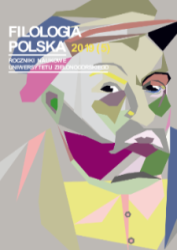Time, Memory, Death – Vladimir Nabokov’s aesthetical-philosophical triade
Keywords
Abstract
This article focuses on three decisive aspects of Vladimir Nabokov’s thoughts and works: memory, time and death. The introductory section gives a general sketch of the temporal problematics connected with literary art; subsequently, ones delves into concrete examples from the novels, essays and statements of Nabokov so as to demonstrate the very specific aesthetic/philosophic approach to the nature of time and consciousness which can be observed in the selected texts. The working hypothesis, which is ultimately confirmed by the majority of Nabokov’s texts, is the following: memory, understood as a form of imagination, is one of the most creative aspects of human consciousness, as it allows one to contradict both death and time.
References
LITERATURA CYTOWANA
Assmann A., Der lange Schatten der Vergangenheit: Erinnerungskultur und Geschichtspolitik, München 2006.
[Google Scholar]
Assmann A., Między historią a pamięcią. Antologia, przeł. Z. Dziewanowska-Stefańczyk, J. Górny, J. Kalicka, A. Konarzewska, K. Kończal, P. Pieńkowska-Wiederkehr, K. Sidowska i A. Teperek, Warszawa 2013.
[Google Scholar]
Boyd B., Nabokov’s „Ada”. The Place of Consciousness, New York 2002.
[Google Scholar]
Davydov S., TekstyMatreski Vladimira Nabokova, München 1982.
[Google Scholar]
Engelking L., Chwyt metafizyczny. Vladimir Nabokov – estetyka z sankcją wyższej rzeczywistości, Łódź 2011.
[Google Scholar]
Hüllen C., Der Tod im Werk Vladimir Nabokovs. Terra incognita, München 1990.
[Google Scholar]
Kant I., Prolegomena do wszelkiej przyszłej metafizyki, która będzie mogła wystąpić jako nauka, przeł. A. Banaszkiewicz, Kraków 2005.
[Google Scholar]
McGowan T., Geneza filmu atemporalnego, „Kwartalnik Filmowy” 2014, nr 86 (przeł. T. Rutkowska).
[Google Scholar]
Nabokov V., Ada albo żar. Kronika rodzinna, przeł. L. Engelking, Warszawa 2009.
[Google Scholar]
Nabokov V., Bend Sinister, New York 1990.
[Google Scholar]
Nabokov V., Dar, przeł. E. Siemaszkiewicz, Warszawa 1995.
[Google Scholar]
Nabokov V., Maszeńka, przeł. E. Siemaszkiewicz, Warszawa 2004.
[Google Scholar]
Nabokov V., Nieprawe godło, przeł. M. Kłobukowski, Warszawa 2006.
[Google Scholar]
Nabokov V., Pamięci, przemów. Autobiografia raz jeszcze, przeł. A. Kołyszko, Warszawa 2004.
[Google Scholar]
Nabokov V., Własnym zdaniem, przeł. M. Szczubiałka, Warszawa 2016.
[Google Scholar]
Nabokov V., Wykłady o literaturze, przeł. Z. Batko, Warszawa 2000.
[Google Scholar]
Nabokov V., Z nieprawej strony, przeł. R. Śmietana, Kraków 1995.
[Google Scholar]
Nabokov V., Zaproszenie na egzekucję, przeł. L. Engelking, Warszawa 2014.
[Google Scholar]
Piatigorski A., ЧутьчутьофилософииВладимираНабокова (Trochę o filozofii Vladimira Nabokova), [.Pitzer] A., Ukryta historia Vladimira Nabokova, przeł. W. Górnaś, Warszawa 2015.
[Google Scholar]
Schlegel A.W., Über dramatische Kunst und Literatur, [w:] A.W. Schlegel, Kritische Schriften und Briefe, wyd. E. Lohner, Stuttgart 1966.
[Google Scholar]
Preview
Downloads
Published
How to Cite
Issue
Section
Categories
Copyright & License

This work is licensed under a Creative Commons Attribution-NonCommercial-NoDerivatives 4.0 International License.
Copyrights (a). In principle, authors who are not employed by the University of Zielona Góra retain the copyright, including publishing rights to the articles, without restrictions.
Copyrights (b). In principle, authors who are employed by the University of Zielona Góra, do not retain the copyright, including publishing rights to the articles. In such cases the copyright holder is the University of Zielona Góra.
Print ISSN
2450-3584-
Abstract119










































